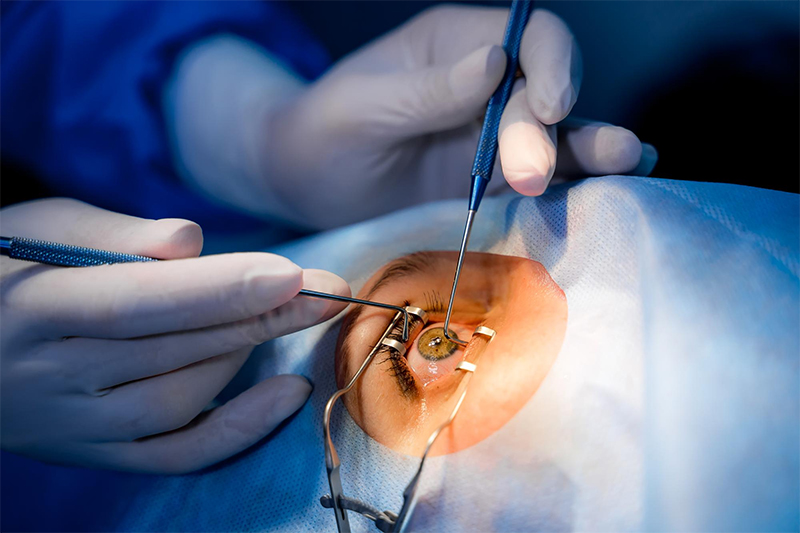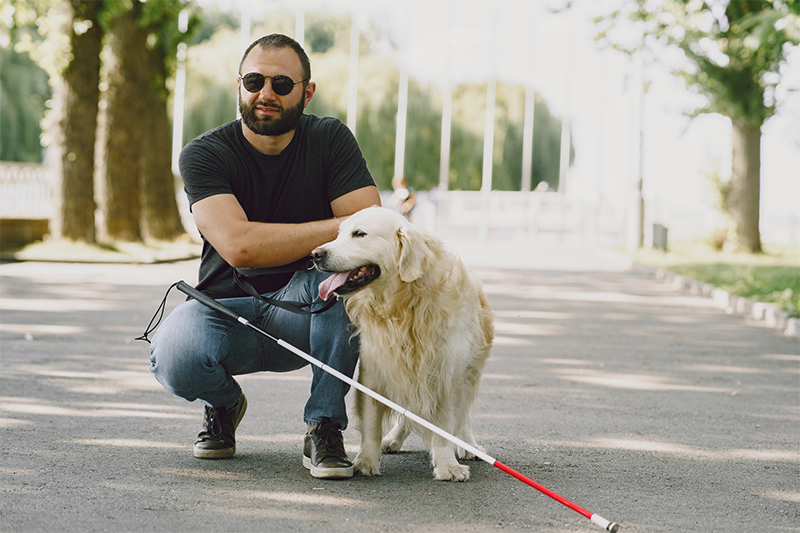Definition of Blindness
According to the World Health Organization (WHO), blindness is defined as a visual acuity of less than 20/400 in the better eye, with the best possible correction. [1] This means that a person with 20/400 vision would need to stand 20 feet from an object to see it as clearly as a person with normal vision can see it from 400 feet away.
In some cases, a person may be considered legally blind even if they have some degree of residual vision. Legal blindness is defined differently in different countries, but it generally refers to a visual acuity of 20/200 or worse in the better eye or a visual field of 20 degrees or less.
There are different degrees of vision impairments, ranging from mild visual impairments, where a person may have blurry vision or difficulty seeing in low light, to severe impairments, where a person may have only light perception or no vision at all.
Blindness can result from various causes, such as age-related macular degeneration, cataract surgery complications, corneal disease, or surgical errors. It can greatly impact a person’s quality of life and their ability to perform daily tasks independently.
Nearly 1.3 million Americans age 40 and older are legally blind. [2]

Risks Involved in Eye Surgery
One of the primary risks associated with eye surgery is a loss of vision. Although this is a rare occurrence, it can happen due to complications during the surgery or as a result of underlying eye conditions. For example, during cataract surgery, a complication could arise that leads to poor visual outcomes or even a complete loss of vision.
Another risk is infection. Like any surgical procedure, eye surgery carries a risk of post-operative infections. This risk can be minimized by adhering to strict hygiene measures and following the surgeon’s instructions for post-operative care.
In rare cases, individuals may also develop long-term complications such as glare, halos, or double vision. These issues can affect a person’s ability to drive or perform daily activities and may require additional treatment or corrective measures.
It’s estimated that the chances of going blind as a result of laser eye surgery are around 1 in 5 million. [3]
Legal Implications for When a Patient Becomes Blind During Surgery
When faced with blindness as a result of eye surgery, it is suggested that the patient and their loved ones seek guidance from a competent attorney specializing in medical malpractice. These attorneys have the expertise and experience necessary to navigate through the complex legal system and ensure that the patient’s rights are protected.
To establish a medical malpractice claim, it must be demonstrated that the surgeon or medical professional involved in the surgery deviated from the accepted standard of care.
This means that their actions or negligence directly contributed to the patient’s blindness. It is important to gather all relevant medical records, including pre-operative assessments, surgical notes, post-operative reports, and any other documentation that can help prove the case.
In addition to proving negligence, it is crucial to establish that the blindness was a direct result of the surgical error or negligence.
This can involve expert opinions from other ophthalmologists or medical professionals who can testify that the outcome was avoidable and caused by the defendant’s actions.
Medical malpractice claims involving blindness during eye surgery can be challenging and emotionally draining.
It is not just about seeking compensation for the physical and emotional trauma caused by the loss of vision but also about addressing the impact it has on the patient’s daily life, their ability to work, and their overall quality of life.
Compensation in these cases may cover medical expenses, including costs associated with corrective surgical procedures or vision aids, ongoing medical treatments, rehabilitation, therapy, and any necessary modifications to the patient’s living environment.
It may also include compensation for the loss of income, loss of future earning capacity, and the pain and suffering endured due to the permanent loss of vision.

Who Can File a Lawsuit?
The person who has experienced the injury can file a lawsuit regarding their loss of vision. In some instances, if the patient is a minor or has been declared mentally incapacitated, a parent, guardian, or legal representative may be able to file a lawsuit on their behalf.
In cases where the patient has passed away as a result of the surgical error or negligence, their family members may have the right to file a wrongful death lawsuit.
It is important to note that the laws regarding who can file a lawsuit may vary depending on the jurisdiction and specific circumstances of the case.
Consulting with a knowledgeable attorney who specializes in medical malpractice law may be helpful in understanding the legal rights and options available in your particular situation.
Rights of the Blinded Patient Under the Law
One fundamental right of the blinded patient is the right to seek compensation for the harm caused by medical malpractice or surgical negligence.
This can include financial losses stemming from medical bills, lost wages, rehabilitation expenses, and the costs of living with a visual impairment.
They may be entitled to damages for pain and suffering, emotional distress, and diminished enjoyment of life.
The legal process provides several options for the blinded patient to pursue their rights. One common course of action is filing a medical malpractice claim against the responsible medical professionals or institutions.
To prove a medical malpractice claim, it is essential to establish four key elements:
- It must be shown that a doctor-patient relationship existed, which implies that a duty of care was owed to the patient.
- It must be proven that the healthcare provider breached that duty by failing to adhere to the acceptable standard of care.
- There must be a direct causal connection between the breach of duty and the patient’s blindness.
- The patient must have suffered damages as a result of medical negligence.

If you have recently been blindsided by a life-altering event during eye surgery, Lein Law is here to help you navigate the complex legal process.
With our extensive experience in handling cases like yours, we understand the pain and frustration you must be feeling. You deserve answers, compensation, and the opportunity to move forward with your life.
Lein Law will fight passionately on your behalf to hold the responsible parties accountable and secure the financial support you need for medical treatment, rehabilitation, and emotional healing.
Contact Lein Law today for a free consultation, and let us guide you through the legal action necessary to reclaim your life and future. Your voice deserves to be heard, and we are here to help you every step of the way.
Sources:
[1] What is Vision Impairment? | Department of Ophthalmology | University of Pittsburgh. (n.d.). What Is Vision Impairment? | Department of Ophthalmology | University of Pittsburgh. http://ophthalmology.pitt.edu/vision-impairment/what-vision-impairment
[2] Eye Health Statistics – American Academy of Ophthalmology. (n.d.). Eye Health Statistics – American Academy of Ophthalmology. https://www.aao.org/newsroom/eye-health-statistics
[3] Can laser eye surgery make you blind? (n.d.). OCL Vision. https://www.oclvision.com/help-centre/can-laser-eye-surgery-make-you-blind/


